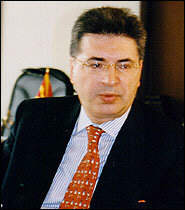 MACEDONIA, STRUGGLING WITH REFORMS, AND OFFERING A NEW VISION FOR EUROPE MACEDONIA, STRUGGLING WITH REFORMS, AND OFFERING A NEW VISION FOR EUROPE |
Situated in Southeast Europe, the Republic of Macedonia, a country of two million inhabitants, occupies 25,000 km2 of the heart of the Balkan Peninsula. However, although "Peninsula" suggests beautiful shores and beaches, Macedonia's surrounding points to a different view: economic surrounding. Although it does not access to any sea, Macedonia is surrounded by four potentially huge markets - Greece, Bulgaria, Albania and FR Yugoslavia. And besides all the differences from the past, Macedonia managed to build strong and friendly relations with each and everyone of these countries. It is not a coincidence that Greece, the only EU and NATO member from the region, is the biggest foreign investor in the Republic of Macedonia. As Minister of Foreign Affairs Srdjan Kerim says, Macedonia has an incredibly important geo-strategic position in the region. It is at the center between the North-South and the East-West axis of the peninsula. Everybody knows that the stability of Macedonia, its prosperity and development, has an effect on the whole region.

Until 1990, the Republic of Macedonia together with Serbia, Croatia, Bosnia and Herzegovina, Montenegro and Slovenia was part of the joint country Socialist Federal Republic of Yugoslavia. The truth is that although Macedonia was "equal" on paper with the other states in the joint country it was also the poorest and with the highest unemployment rate. However, all six countries managed to live in unity for 45 years in relative peace and harmony.
When one by one the member states started demanding independence, Macedonia was caught in the middle: whether to stay in what was left from the biggest country in the Balkans, or to proceed in the uncertain future as an independent and sovereign State. And that was the moment when Macedonia proved its democratic orientation. Led by the wisdom of the first President Kiro Gligorov, on the referendum carried out in June of 1991 the Macedonian people voted for independence. The Macedonian Assembly adopted the decision on June 7, 1991. And what was more important, Macedonia, unlike Slovenia, Bosnia and Herzegovina and Croatia, gained its independence in a completely peaceful manner. But very swiftly the euphoria faded and the new country faced the reality.
Starting from that moment, the Republic of Macedonia faced the uncertainty about the future. The gigantic companies like "Zelezara", "MZT", "Porcelanka", projected for the needs of a country with population of 22 million became useless in independent Macedonia with population of two million and were all one by one shut down. This situation drastically increased the already high unemployment rate. The need for privatization became a necessity, though it appeared that this process would not be an easy one.
Looking from today's standpoint, one can easily conclude that Macedonia would not have made it if it wasn't for the foreign help it received, especially from the international financial institutions, such as PHARE, EU, IMF, World Bank and EBRD.
However, in order to receive this assistance, Macedonia had to fulfill numerous conditions, some of them very painful for the already exhausted Macedonian economy.
After the parliamentary elections in 1998, the new Macedonian Government completely committed itself to carrying out the started reforms, especially in the national economy. The first demand from the IMF for stable budget was fulfilled very swiftly thanks to several smart moves, such as the implementation of the Value Added Tax. This financial instrument allowed Macedonia to mark a growth of 6% to the Gross Domestic Product by the end of fiscal 2000.
Stability of the budget also meant guarantee for the foreign investors and opening of favorable credit lines for what will probably be the cornerstone of Macedonia's economy tomorrow - the small and medium-sized enterprises. |
In order to provide more foreign investments, and to increase the level of privatization, Macedonia completely opened its doors by signing the so-called "free trade agreements", first with the countries from the region (Bulgaria, Yugoslavia, Croatia, Slovenia), and then with Ukraine, Turkey and EFTA countries.
This proved the trust that the European Union had in Macedonia through the entire negotiating process for Macedonia's integration in the joint European family, which started by the end of 1995. Therefore, no one was surprised by the fact that Macedonia was the fist country to sign the Stabilization and Association Agreement with the EU, on April 9 2001. The agreement also included a clause according to which, Macedonia will be allowed to freely export goods to the EU markets, except for the wine and lamb meat.
Macedonia is an excellent example that good economy eliminates every other problem in the society. For example, one of the bitterest problems that the country was facing was the dispute with Greece over the Macedonian name and flag. Today, Greece is the largest foreign investor in Macedonia.
The privatization process also provided elimination of the vast gray economy, which appeared in the first years of Macedonia's independence.
In addition to that, the privatization and establishment of a free market put also an end to the monopoly of each and every industry in Macedonia, as illustrated by the recent privatization of the " Macedonian Telecom". Most of the large and still public enterprises, such as "Makedonija Pat" Road Company and "ESM" national electricity company will be privatized very soon.

Macedonia also has a strong agro-industry, remaining from former Yugoslavia some may say, but still, Macedonia's main export products are the wine and the tobacco. "We are hospitable, we have a cheap and highly skilled work force, especially in the agro-complex, with a long tradition in cultivating agricultural products," Macedonian Minister of Agriculture Marjan Gjorcev says. Thanks to the efforts undertaken by the Government, and especially thanks to the EU's support, Macedonia's agro-complex is one of the most developed in the region. "We are working on the legislation according to the EU and new marketing strategies focused on the presentation and distribution of primary goods," Gjorcev stated.

Even though Macedonia does not have sea access, the country has overwhelming beauties to offer to the tourists. The famous Ohrid Lake, the highest mountains in the Balkans offering beautiful ski resorts…and this is not where it ends. The Macedonian Ministry of Environment is developing a project for so called 'alternative' tourism, including the country and monastery tourism. "Macedonia has so much to show and nothing much has been done in that direction. I refer especially to the part of alternative tourism and its promotion," Minister of Environment Marjan Dodovski said.
True, Macedonia is still a "developing country" but according to every indicator it won't be long until the country stands solid as a rock, even if compared with the "developed countries". |

